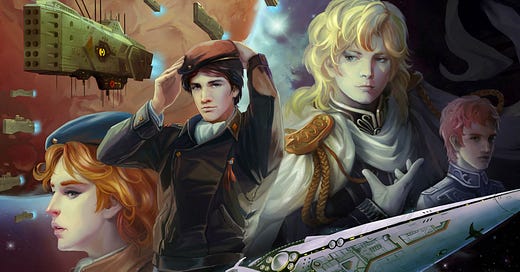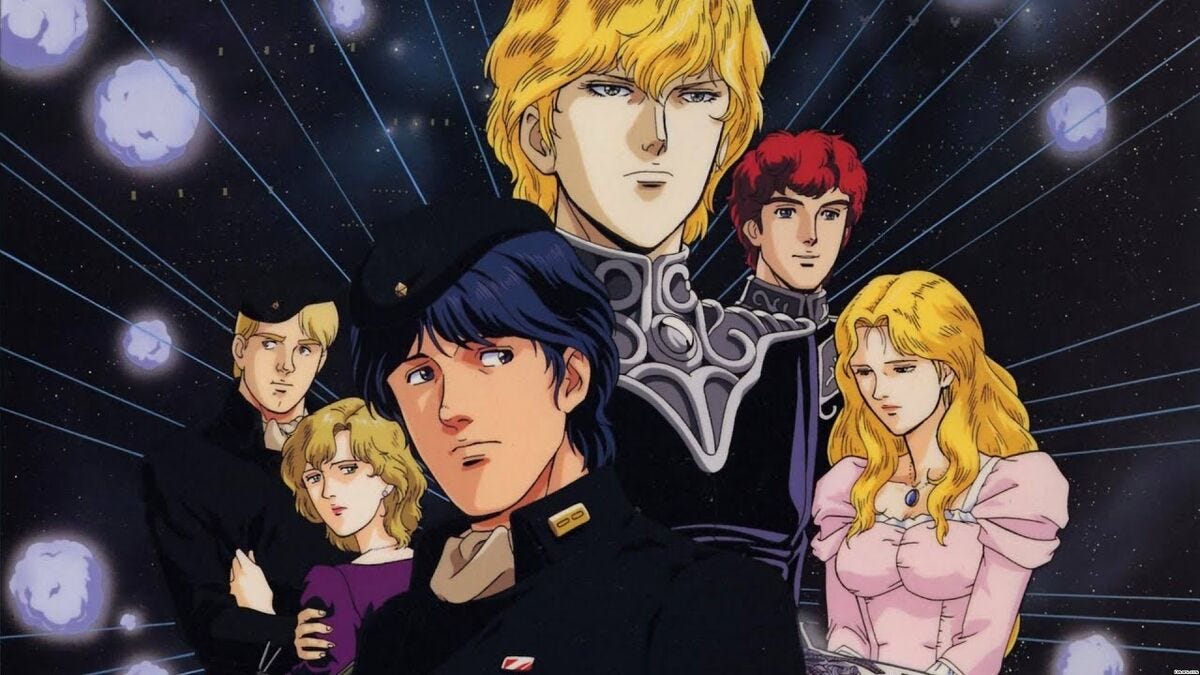[Book Review] Legend of the Galactic Heroes
A review of the first 3 books of the legendary series... An resurgent imperial dictatorship and a collapsing republic at war
This is a topical work of literature that helps to describe war and collapse in the face of larger long-term cultural forces. The books delve deeply into the knock-on effects of a decaying republic in an uncertain world. It is highly recommended reading for anyone who has been paying attention to geopolitics in the early 21st century. In some ways this series could be seen as reconstructivist fiction.
Legend of the Galactic Heroes is an older series of science fiction books by Yoshiki Tanaka. Volume 1 to Volume 3 of the series have been translated to english and are available on audible in audio-book form.
Initially, the series is centered around two characters: Count Reinhard Von Lohengramm and Commander Yang Wen Li. The series tends to follow the “Great Man” theory of history and focuses on the two titular characters as the Great Men of each respective civilization.
Both characters are military commanders that quickly ascend the ranks due to extreme personal acumen. A perpetual conflict between the Galactic Empire (modeled after the Prussian Empire) and the Free Planets Alliance (modeled after England or the United States) creates fertile ground for the quick ascendancy of military heroes. The story is mostly about political upheaval in the unstable governments, intrigue and coups. The military conflicts of direct engagements are just the icing on the literary cake.
The story of the Legend of the Galactic Heroes somewhat resembles the ancient Chinese story: Romance of the Three Kingdoms. Legend of the Galactic Heroes is about politics, friendship, war, love, ambition, ancestry, fatherhood, and camaraderie. The story takes place as a new stage begins in the ongoing war between the Galactic Empire and the Republic of the Free Planets Alliance.
There is a third faction, Phezzan, a mercantile nation that acts as a third party to the conflict. Both the Empire and the Free Planets Alliance fail to formerly acknowledge one another diplomatically. Phezzan is therefore the main corridor through which any informal political diplomacy must take place. Phezzan obviously leverages this for both political and economic gain.
Formally, Phezzan is a semi-autonomous region of the Empire but acts as a fully independent nation carefully balancing the Empire and Free Planets against one another through subterfuge. The careful balancing act of Phezzan allows them to maintain independence by keeping the other two factions busy.
At the beginning of the story, both the Free Planets Alliance and the Empire are at war out of sheer inertia. They’ve been in a state of conflict for hundreds of years. Neither side sees any great benefit to ending the war, and so it proceeds, more to maintain internal political stability than with any real hope of victory in combat.
Out of a particularly difficult engagement emerges Count Reinhard von Lohengramm as a brilliant strategist of the Empire. Reinhard leverages his position as strategic genius and his political connections to begin feeding his ambition; hoping to eventually seize the reigns of power from the Emperor for himself. Reinhard sees that the aristocracy has stifled the Empire, and he sees that the current Imperial dynasty is failing. Reinhard wishes to seize power, reinvigorate the Empire and use that as a springboard for true galactic conquest.
At the same time, Yang Wen Li emerges on the other side of the conflict. Yang is a young commander of the Free Planets Alliance navy. It was only through the brilliance of Yang that the FPA fleet was saved from total annihilation at the hands of Reinhard. Thus, Yang also returns to the republic a war hero. Yang, is very different from Reinhard. Unlike Reinhard, Yang has no real ambition for political power, he merely looks at war as a game he is good at winning. Lacking significant political skill or ambition, Yang is thrust into progressively higher leadership roles by others who wish to use him. Mostly by politicians who either want to see him fail, or who want to use him as a pawn to further their own ambitions.
While Reinhard is a Faustian “might is right” man of ambition and dreams, Yang is a quintessential status-quo centrist. Yang is the type of man that is produced in decaying republics; a simple humanitarian and holds many liberal values but has a difficulty articulating any reason to do so outside of “hurting people bad.”
The distinction between Reinhard and Yang mirrors a duality of civilizations. Ambition and Complacency. It is the nature of a dictatorial Empire that once every few generations a single brilliant man can reinvigorate the whole civilization. While it is the nature of a republic that it requires large groups of well organized individuals to overthrow the established order and rebuild the republic as something new. Simultaneously, two or three bad leaders can lead to the destruction of an Empire while it takes a succession of bad leaders and bad voters over time destroy a republic.
The first three volumes of the Legend of the Galactic Heroes are about how civilizations are born, grow, age, and die. How civilizations can be reinvigorated from the brink of death, and how the pains of aging slowly consume societies from within through decadence and hubris.
Ultimately the books ask important questions about the nature of civilization, the nature of heroic figures in those civilizations. The Legend of Galactic Heroes is fundamentally about the natural human assumption that our civilization will somehow last forever, unchanging. It challenges the reader to view civilizations and dynamic and transitory things that age, decay, and are reborn over time.
The Legend of Galactic Heroes also provides a great deal of relatively accurate strategic information. Especially regarding the function of Republics and their methodology of action. Who really holds the levers of power in a republic? How can those levers be seized and used for other ends? There is a period in the series where a coup is attempted, but the leaders of the coup fail to properly determine where the true levers of power are, and who holds them. An understanding of the underlying mechanisms of power is critical to success in attempts at overthrow or reform. The book series makes that very clear.
Were it not for the fact that this series was published decades ago, one would think that Volumes 2 and 3 were allegories for the last few years of American Politics. How the politicians behave, how they use an “attempted coup” as a justification for even greater power, and how politicians crush opposition without technically breaking their own laws.
This book series comes highly recommended due to the philisophical questions it asks, the strategic information it provides to those attempting to survive a decaying republic, and the brilliant writing and story. What does it truly look like to be the men among the ruins of a once great civilization, and what does it take to reform a civilization before it gets to that point? It is about the fundamental mortality of civilizations.






God I love this series. I've watched the show and rewatched parts of it and just adore so much of what it attempted and accomplished.
I don't think there's a space opera that is more operettic, even if there are space operas that are more "space".
I think you could've been a bit more charitable to Yang. There IS philosophical rationale behind his ideology (it's just not very good imo) and he does represent virtues like moderation and a calm collected reasoning more than Reinhardt. He's not JUST a hippie peace lover. He DOES want change but he doesn't think he has the authority to mandate it. I feel as if you compared him to the managerial elites of our modern age, like if General Milley had to fight against an Alexander.
Thanks for the review! Been craving some good science fiction, and this sound excellent while I wait for Devon’s book to be completed.
When Bushido is done, I’ll share with you for a review. We decided to add a story in there for 50yrs in the future and how things have changed.